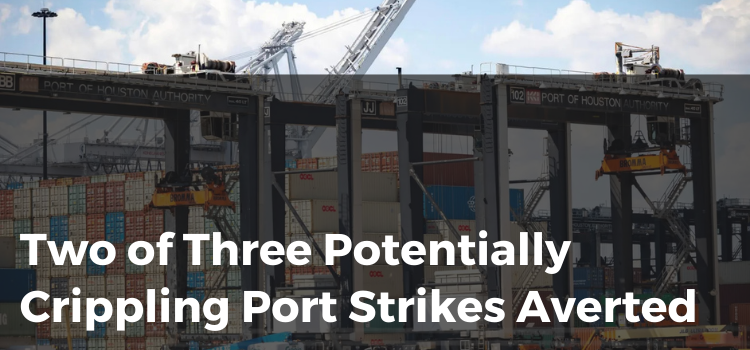Two of Three Potentially Crippling Port Strikes Averted

In the fourth quarter of 2024, a significant challenge was presented by the possibility of strikes by two auto worker unions and the International Longshoremen’s Association (ILA). However, after extensive negotiations lasting over 70 hours, VW, IG Metall, and the Works Council came to an agreement on a joint framework titled ‘Zukunft Volkswagen’ [Future Volkswagen]. This agreement demonstrates a commitment to finding common ground and ensuring the future stability and success of Volkswagen.
Volkswagen AG, as the second largest car maker globally, has historically faced challenges related to labor costs in Germany impacting its competitiveness. However, the company’s management and the Works Council recently reached an agreement aimed at addressing this issue. Both parties believe that this agreement will position Volkswagen AG for long-term success and sustainability. This commitment demonstrates Volkswagen’s dedication to addressing challenges and ensuring long-term viability in the global market.
The realignment of production capacities at Volkswagen AG’s German locations is a critical component of a strategic plan to improve cost efficiency and remain competitive in the global market. Shifting production to lower labor cost factories in China and other parts of the world will optimize their resources and increase profitability. The company plans to reduce production of over 734,000 vehicles before 2030, which will necessitate workforce adjustments. This decision is difficult but necessary in order to align with market demands and ensure the long-term sustainability of the business. to align with the competitiveness of the company in the global market.
The International Longshoremen’s Association (ILA) and the U.S. Maritime Alliance (USMX) reached a tentative agreement on a new six-year master contract on January 8th, just seven days before the previous contract was set to expire. The ILA negotiated a 62% wage increase win over the course of the six-year contract and stood firm in their opposition to port automation. This agreement ensures labor stability and productivity in the maritime industry, providing a framework for continued growth and development.
The USMX has made the argument that automation in gate checks is necessary for the Gulf and East Coast ports to remain competitive with global ports that have already implemented such technologies. While full automation was not agreed upon, USMX members have been granted the ability to introduce modernizing technology at their discretion. This move is aimed at improving efficiency and maintaining competitiveness in the global market. It is a step towards modernization and ensuring that these ports remain at the forefront of international trade.
The International Longshoremen’s Association (ILA) has secured guarantees for specific jobs associated with new equipment additions. While the agreement still requires ratification by ILA members, the likelihood of approval is high. A prolonged strike at these ports would have a devastating effect on the economy and the supply of collision repair parts. Fortunately, this outcome has been averted. The ILA’s successful negotiations have helped to ensure stability and continued operations at the ports, which is crucial for both the local and national economy.
The ongoing union strike threat between Stellantis and the United Auto Workers remains unresolved, adding to the challenges faced by the automaker. The UAW has raised concerns about Stellantis’s alleged violations of their new contract, including the delay in reopening the Belvidere factory and the relocation of Dodge Durango production. The union is seeking resolution to these issues to ensure compliance with the ratified agreement and the protection of its members’ jobs.
Stellantis has refuted claims of failing to fulfill its commitments and attributes delays in reopening the Belvidere plant to sluggish sales. The company filed lawsuits against the UAW, alleging bad-faith threats of a strike. In response to the company’s legal actions, the UAW president, Shawn Fain, indicated the potential for a strike authorization vote in January. However, as of publication, no such vote has occurred. The situation between Stellantis and the UAW remains unresolved, and the timeline for reopening the Belvidere plant is still uncertain.
The potential for two catastrophic impacts for both the local and national economy have been successfully mitigated, and the resolution of the potential strikes against Stellantis by UAW are now crucial for the financial stability of the automaker. If a strike were to happen, it could significantly damage the company’s finances and potentially lead to the sale of its U.S. brands, including Jeep and Ram, as several global automakers are interested in acquiring these well-regarded brands. The outcome of negotiations between Stellantis and UAW will have a significant impact on the future of the company and the automotive industry as a whole.
We’ll keep you updated with the newest developments and information. Thanks for staying tuned!
